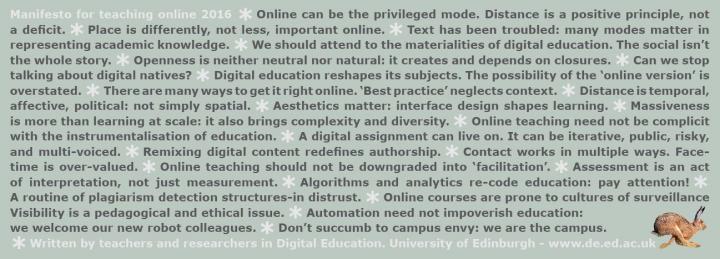A manifesto for teaching online by Jen Ross and Siân Bayne
Key issues and debates in teaching online.
During a time of expansion of online education at the University of Edinburgh, we need to make time and space to discuss and debate key issues, and to think critically about our likely and preferred futures for digital education. As online teachers, we have to respond through our pedagogies and assessment and feedback practices to visions of the future put forward by a range of stakeholders, including political, corporate and media interests, and to a relentless orientation to the ‘next big thing’.
With more than 65 online Masters programmes and around two million MOOC learners we need, more than ever, opportunities to engage with each other and our students about what we are doing, how we are doing it, and why.

The Manifesto for Teaching Online is a series of short statements first written in 2011 by the Digital Education group in the School of Education, and revised in 2016. It takes a position about online education that informs the work of the group and the MSc in Digital Education programme we lead. This position is perhaps best summarised by the first of the manifesto statements:
Online can be the privileged mode. Distance is a positive principle, not a deficit
Such a position is at odds with more mainstream ideas of digital education that tend to describe it either in terms of replication of offline practices, or in terms of inadequacy, where online learning is the ‘second best’ option when ‘real’ (face-to-face) encounters are not possible or practical. We introduce a few more of our manifesto points here, each of which try to reimagine some of the truisms and orthodoxies that surround the field of digital education.
Can we stop talking about digital natives?
This point can be read equally as a question or a plea. Generation-based, essentialising accounts of technology use and affinity have been shown to be unhelpful both practically and conceptually, and have been thoroughly critiqued and discredited in recent years by researchers. Nevertheless, they have if anything become more prominent in media, web, corporate and policy discourses, justifying everything from a need for total ‘disruption’ of educational systems, to supposed lack of capacity for reflection and attention on the part of young people, to the impossibility of anyone over a certain age truly belonging in digital spaces. The public conversation sometimes appears to shift, but there is still work to do before we see the demise of the homogenising binaries set up by talk of digital natives.
Algorithms and analytics re-code education: pay attention!
When we take into account digitally-produced educational resources, assessment via automated marking, plagiarism detection, descriptive and predictive learning analytics, educational data-mining, digital research methods, academic metrics, social media footprints and email dependence we come to an understanding that there are very few areas of contemporary educational practice which do not take place in code-spaces, or are not shaped by coded practices. We need to better understand how to work within the new algorithmic culture to create pedagogies which are engaging, challenging and willing to take risks.
The tendency to see automation, for example, as complicit with cost-cutting, efficiency drives and teacher de-professionalisation needs to be tempered with an understanding that it can also work in favour of a critical, creative approach. One example of this is the ‘teacherbot’ we developed to work as co-tutor in one of our MOOCs.
The teacherbot was just one attempt to put into practice the manifesto point that claims:
Distance is temporal, affective, political: not simply spatial.
The ‘anytime, anywhere learning’ cliché has been applied regularly to digital education over the last few decades. However, there’s still a tendency in the literature to focus on space (the ‘anywhere’) more than on temporality (the ‘anytime’). This preoccupation with space over time means that we have not paid a great deal of attention to how digital technologies produce new experiences of time and new temporal distances between teachers and students. What’s more, emotional, ‘felt’ distance is as important a teaching challenge as spatial and temporal distance.
In research we conducted with our own online students we found that while distance students had many ways of relating to the material campus of the university, one dominant position was of ‘campus envy’ - a tendency for students to view the campus as an emotional and symbolic ‘home,’ and as a kind of touchstone or guarantor of the authenticity of academic experience.
The ‘campus’ is now constituted in multiple ways by people, technologies, spaces and networks that are global and have a fluidity which makes the boundaries of campus space extremely leaky. Our final manifesto statement tries to emphasise this need to understand the campus as global, connected, fluid and constituted by our distance students as much as those who are here in Edinburgh:
Don’t succumb to campus envy: we are the campus.
The manifesto for teaching online is an open invitation – and a challenge – for new formulations of these and other issues. It has been used as a prompt for conversations in a wide range of contexts, and is open access so that teachers, students, researchers and others with an interest in this field can rework and remix it.
Find out more:
The IAD offers bursaries to staff who wish to enrol on the Introduction to Digital Environments for Learning (IDEL) course. This course is worth 40 credits and is the foundation element of the MSc in Digital Education. Bursaries are open to all staff at the University who are working in or considering developing an Online Distance Learning (ODL) programme.
In addition, applications will be considered to fund a 20-credit course, for those who have previously been awarded an IDEL bursary.
The next deadline is Thursday 30th June 2016 (for Sep 2016 intake).
If you have any queries please email iad.odlstaff@ed.ac.uk or browse the online distance learning community pages on the University website.

